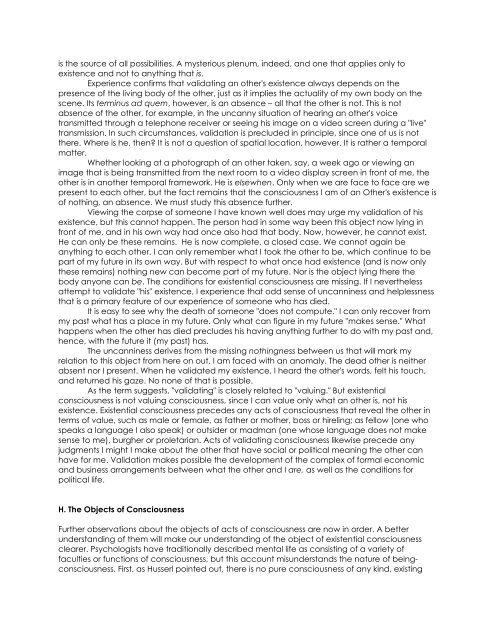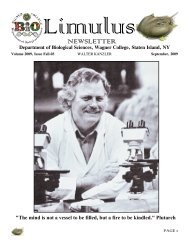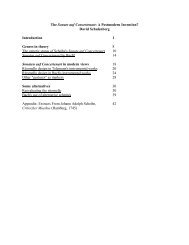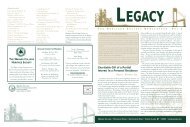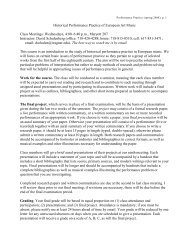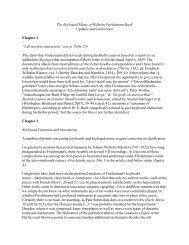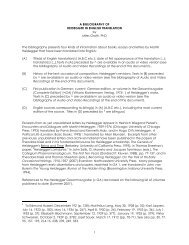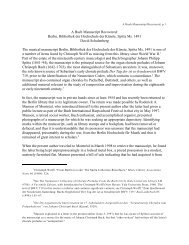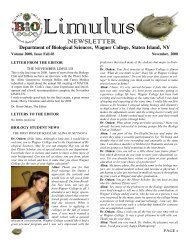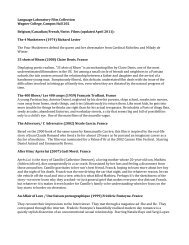SEVEN PAPERS ON EXISTENTIAL ANALYSIS ... - Wagner College
SEVEN PAPERS ON EXISTENTIAL ANALYSIS ... - Wagner College
SEVEN PAPERS ON EXISTENTIAL ANALYSIS ... - Wagner College
Create successful ePaper yourself
Turn your PDF publications into a flip-book with our unique Google optimized e-Paper software.
is the source of all possibilities. A mysterious plenum, indeed, and one that applies only to<br />
existence and not to anything that is.<br />
Experience confirms that validating an other's existence always depends on the<br />
presence of the living body of the other, just as it implies the actuality of my own body on the<br />
scene. Its terminus ad quem, however, is an absence – all that the other is not. This is not<br />
absence of the other, for example, in the uncanny situation of hearing an other's voice<br />
transmitted through a telephone receiver or seeing his image on a video screen during a "live"<br />
transmission. In such circumstances, validation is precluded in principle, since one of us is not<br />
there. Where is he, then? It is not a question of spatial location, however. It is rather a temporal<br />
matter.<br />
Whether looking at a photograph of an other taken, say, a week ago or viewing an<br />
image that is being transmitted from the next room to a video display screen in front of me, the<br />
other is in another temporal framework. He is elsewhen. Only when we are face to face are we<br />
present to each other, but the fact remains that the consciousness I am of an Other's existence is<br />
of nothing, an absence. We must study this absence further.<br />
Viewing the corpse of someone I have known well does may urge my validation of his<br />
existence, but this cannot happen. The person had in some way been this object now lying in<br />
front of me, and in his own way had once also had that body. Now, however, he cannot exist.<br />
He can only be these remains. He is now complete, a closed case. We cannot again be<br />
anything to each other. I can only remember what I took the other to be, which continue to be<br />
part of my future in its own way. But with respect to what once had existence (and is now only<br />
these remains) nothing new can become part of my future. Nor is the object lying there the<br />
body anyone can be. The conditions for existential consciousness are missing. If I nevertheless<br />
attempt to validate "his" existence, I experience that odd sense of uncanniness and helplessness<br />
that is a primary feature of our experience of someone who has died.<br />
It is easy to see why the death of someone "does not compute." I can only recover from<br />
my past what has a place in my future. Only what can figure in my future "makes sense." What<br />
happens when the other has died precludes his having anything further to do with my past and,<br />
hence, with the future it (my past) has.<br />
The uncanniness derives from the missing nothingness between us that will mark my<br />
relation to this object from here on out. I am faced with an anomaly. The dead other is neither<br />
absent nor I present. When he validated my existence, I heard the other's words, felt his touch,<br />
and returned his gaze. No none of that is possible.<br />
As the term suggests, "validating" is closely related to "valuing." But existential<br />
consciousness is not valuing consciousness, since I can value only what an other is, not his<br />
existence. Existential consciousness precedes any acts of consciousness that reveal the other in<br />
terms of value, such as male or female, as father or mother, boss or hireling; as fellow (one who<br />
speaks a language I also speak) or outsider or madman (one whose language does not make<br />
sense to me), burgher or proletarian. Acts of validating consciousness likewise precede any<br />
judgments I might I make about the other that have social or political meaning the other can<br />
have for me. Validation makes possible the development of the complex of formal economic<br />
and business arrangements between what the other and I are, as well as the conditions for<br />
political life.<br />
H. The Objects of Consciousness<br />
Further observations about the objects of acts of consciousness are now in order. A better<br />
understanding of them will make our understanding of the object of existential consciousness<br />
clearer. Psychologists have traditionally described mental life as consisting of a variety of<br />
faculties or functions of consciousness, but this account misunderstands the nature of beingconsciousness.<br />
First, as Husserl pointed out, there is no pure consciousness of any kind, existing


